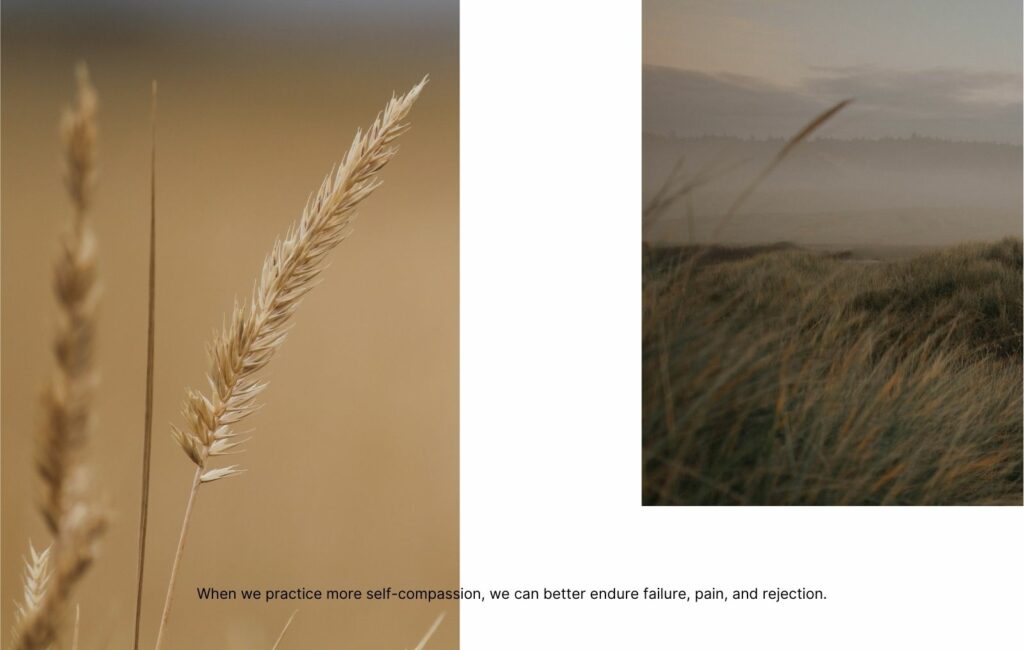After a failure, we can be our own worst enemy. But it helps to be kind and forgiving with yourself: Self-compassion strengthens mental resilience and it can be trained.
We usually blame ourselves first in many things. “Why do these things always happen to me? Why did I do this wrong again?” We are always stricter to ourselves then to other people. We are dissatisfied and criticize ourselves. Instead of acknowledging that everyone, including us, makes mistakes, we can get lost in this negative self-talk.
What is self-compassion?
Compassion for ourselves is not different from compassion for other people. It means that we treat ourselves in hard times, when we fail or something doesn’t go the way we thought it would, as we would treat a good friend.
Through self-compassion we learn not to measure our lives by our accomplishments, but to accept ourselves as human beings, with everything that goes with it.
Several studies¹ prove the positive effects of self-compassion. The participants coped better with aging, illnesses, failures, etc. They were less stressed and felt less ashamed. In addition, it was found that people with high self-compassion were less prone to anxiety disorders and depression² and they recovered more quickly from setbacks.
The Difference Between Self-Compassion and Self-Pitty
You shouldn’t compare self-compassion to self-pity. When you feel self-pity, you become completely immersed in your world of negativity. You forget that others have similar problems. One’s own suffering becomes the center of one’s emotional world. It reinforces the feeling of scarcity – one feels separated from the rest of the world and other people, one becomes a victim of circumstances.
The three elements of self-compassion
Originally, the concept comes from the Buddhist philosophy. Not to be judgmental, but to be kind to oneself is the way. To give oneself recognition and love and not to look for it in the outside.
The US-American scientist Prof. Dr. Kristin Neff distinguishes three elements:
- Self-kindness (vs. self-judgment).
- Instead of criticizing ourselves, we treat ourselves with understanding and kindness. We give ourselves what we need at that moment.
- Common humanity (vs. isolation).
- We recognize that pain and suffering are part of life and that it is normal to have periods when we are not doing well. We recognize that we are not alone in the world with our feelings and problems.
- Mindfulness (vs. over-identification).
- Instead of repressing our feelings and thoughts or over-identifying with them, we accept and embrace them. We don’t judge them, we just let them be there.
So when we practice more self-compassion, we can better endure failure, pain, and rejection because we don’t judge ourselves. We learn that we are not to blame, but can then take responsibility for ourselves, accept and forgive ourselves.
But how can we practice it in our everyday life?
The good thing is: Self-compassion can be learned. Dr. Kristin Neff and psychologist Christopher Germer of Harvard Medical School developed an eight-week course called “Mindful Self-Compassion” and several shorter practices and meditations.
One effective exercise, for example, is the self-compassion break. You can do this exercise every now and then, for example when you have a lot on your mind or you don’t feel well.

Exercise: The self-compassion break
Take a few minutes for yourself and read the instructions:
- Be mindful – feel the moment
- Think of a situation that causes you unpleasant feelings. Try to notice what happens to your body as a result. Do your shoulders pull up? Do you get a mummy feeling in your stomach? Feel consciously. Now name what that feeling is. Is it stress? Fear? The feeling you’re not enough?
- Common humanity
- Open your mind without denial. Recognize that you are not alone with this feelings. Others are going through it too. Tell yourself, “Everyone makes mistakes.” or “It’s okay, and part of life.” or “I’m not alone.”
- Self-kindness – Be a good friend to yourself.
- Treat yourself as you would treat a good friend. Tell yourself “I accept myself as I am.” Find words that work for you. Ask yourself: What do I need right now, what is good for me?
Meditation for Self-Compassion
In addition to the practice, you can also train your self-compassion while meditating. Dr. Kristin Neff has developed effective and relaxing meditations. With a selection of over 15 Guided Meditations, there is something for everyone.
Everyone is different and has different preferences. If this exercise doesn’t appeal to you, just check out Dr. Kristin Neff’s website for more exercises. There will surely be one for you!
We wish you all the best!
Interesting links
- If you want to test how developed your Self-Compassion is, you can do the test, directly developed by Dr. Kristin Neff, here: Test
- TedTalk by Kristine Neff
1 https://self-compassion.org/the-research/
2 https://www.ncbi.nlm.nih.gov/pmc/articles/PMC4591980/ , https://d-nb.info/1166320464/34

